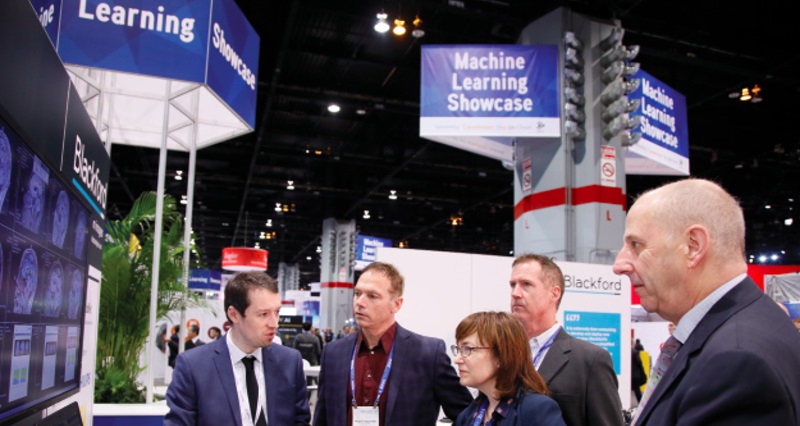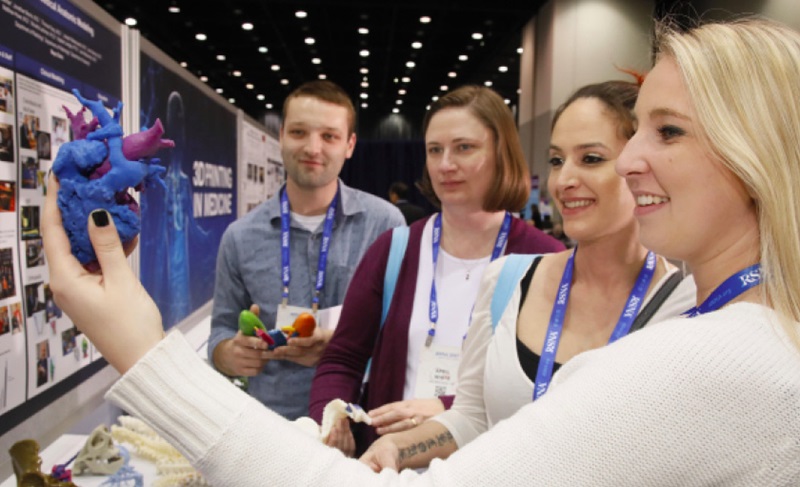RSNA Leads the Way in Artificial Intelligence, Machine Learning, 3D Printing
As a leader in cutting-edge technology, RSNA continues to expand its offerings in key areas revolutionizing radiology and all of health care: Artificial intelligence (AI), machine learning (ML) and 3D printing.
From daily sessions, poster presentations and hands-on courses to technology demonstrations and dedicated showcases, RSNA 2018 programming is at the forefront of these transformative technologies.
Located in the Learning Center, the AI Learning Community will feature demonstrations, proffered posters and education exhibits as well as invited presentations highlighting the application of ML and AI on medical imaging, including how these emerging tools and methodologies may improve patient care.
AI, ML Opportunities Abound at RSNA 2018
AI Learning Community
Poster discussions include:
• Automated Foreign Object Detection in Chest X-Ray Images Based on Deep Learning — AI201-SD-SUB1
• Prostate Cancer Lesion Segmentation and Gleason Score Prediction Using Multi-parametric MRI via Deep Residual Neural Network — AI203-SD-MOA4-ALL
• Patient Data Adapted Deep Learning for Multi-Label Chest X-Ray Classification — AI218-SD-TUB3-ALL
• Support Vector Machine Model for Stratification of Liver Stiffness using Clinical Data — AI230-SD-THA1-ALL
Also in the Learning Center, the RSNA Deep Learning Classroom presented by NVIDIA Deep Learning Institute, will offer a hands-on opportunity to engage with deep learning (DL) tools, write algorithms and improve understanding of DL technology. Nearly two dozen, 90-minute courses will be offered.
Machine Learning Showcase
Located in the Technical Exhibits Hall, North Building, the Machine Learning Showcase includes more than 80 companies offering information and innovations in ML and AI software and products. From 11 a.m. to 2 p.m. daily, the Machine Learning Theater will feature presentations on the latest hot topics in AI, ML and DL.
The Machine Learning Showcase is sponsored by Arterys and Google Cloud.
ML Pneumonia Detection Challenge
For the RSNA 2018 Machine Learning Pneumonia Challenge, teams were invited to use a publicly available National Institutes of Health (NIH) dataset to develop algorithms to identify and localize pneumonia on chest X-rays. The most accurate submissions will be recognized with posters describing their methodologies at the Machine Learning Theater. Kaggle will donate $30,000 to be shared among the top entries.
Related education exhibits:
• Methodology to Curate and Crowdsource Annotation of the Chest X-ray14 Dataset for the RSNA-STR Machine Learning Challenge: How We Did It — AI021-EC-X
• Quality Assurance for Crowdsource Annotation of the Chest X-ray14 Dataset for the RSNA-STR Machine Learning Challenge: How We Did It — AI-149-ED-WEB1-ALL

Artificial Intelligence Highlights at RSNA 2018
Artificial intelligence, machine learning and deep learning are embedded in courses of every subspecialty throughout the meeting. Highlights include:
• Application of Machine Learning in Clinical Decision Support Systems — RCC24D
• Deep Learning for Discovery of Latent Information in Contrast Free Cardiac CT Images — AI025-EB-SUB
• Machine Learning-Assisted System for Thyroid Nodule Diagnosis: A Step Towards Precision Medicine — SSE18-02
• Real-World Performance of Deep-Learning-based Automated Detection System for Intracranial Hemorrhage — RC305-11
• Leveraging Machine Learning Techniques and Predictive Analytics for Knowledge Discovery in Radiology (Hands-on) — RCA34
• Multi-Kernel Synthesis for CT Images Using a Deep Convolutional Neural Network — SSK18-05
• The Impact of Artificial Intelligence on Radiology Training and Practice Around the World (Sponsored by RSNA Committee of International Radiology Education) — RC616
• Robotic Process Automation: Go Beyond Artificial Intelligence in the Radiology Department — IN100-ED-X
• 3-Minute Recipe for Deep Learning: Principle, Hardware, and Software — IN116-ED-X
• Application of Deep Learning to Pancreatic Imaging - The Radiologists’ Perspective — IN129-ED-X
• Possibility of Deep Learning Technique in Medical Imaging: Can Deep Learning Improve Image Quality? — PH110-ED-X
• New Algorithm Incorporating Machine Learning Improves Lung Cancer Risk Calculation on Screening CT Scans —SSC03-03
RSNA 2018: Unlock the Potential of 3D Printing
The Learning Center features 3D printing presentations embedded within all subspecialties. All-day exhibits featured during the meeting include:
• Visualization of Retained Surgical Items Using a Tissue Realistic 3D Printed Abdominal Trauma Phantom— ER004-EB-X
• Enhancing Understanding of Pathology with 3D Printed Prostate Cutting Guides — IN003-EB-X
• Bringing Breast Imaging to Life: How and Why to Incorporate 3D Printing into Your Practice — IN130-ED-X
• Designing, Engineering and Building a Custom and Versatile Liver Phantom for Multi-Energy CT using a 3D Printer: Challenges, Pitfalls, and Costs — IN139-ED-X
Also in the Learning Center, the RSNA 3D Printing Special Interest Group (SIG) will host a self-directed exhibit on the latest research and innovations in 3D printing for medical applications. Those interested in learning about the 3D Printing SIG can visit the kiosk located in the Informatics Community.
3D Printing & Advanced Visualization Showcase
Previously located in the Learning Center, the new 3D Printing & Advanced Visualization Showcase is located in the Technical Exhibits Hall, South Building.
This year’s showcase will feature daily sessions, a display of 3D-printed artifacts and exhibitors featuring the latest 3D imaging and advanced visualization products. The 3D Printing SIG will offer a variety of lectures in the showcase.
The 3D Printing & Advanced Visualization Showcase is sponsored by TeraRecon.
Explore 3D Printing Courses at RSNA 2018
RSNA 2018 offers a range of informational sessions and opportunities in 3D printing, including:
• Hybrid (CT and MR) 3D Printing Models in Chest Tumors: How I Do It Step-By-Step — CH238-ED-SUA6-ALL
• 3D Printing for Liver Surgery Planning: A Step by Step Guide — IN142-ED-SUB2
• Impact of 3D Printed Prostate Cancer Models in Pre-Surgical Planning and Patient Care — SPSH20C
• Emerging Technology: 3D Joint Imaging — RC417
• 3D Printing in Radiology: What We Have Learned and Where We Are Going — DT40
• Reducing Operating Room Time by Using In-House 3D-Printed Models of Inferior Orbital Wall Fractures for Pre-contouring Osteosynthesis Implants — SSM13-02
• A Realistic Pediatric Abdominal Phantom with Contrast Enhancement Using 3D Printing Technology: Comparison with Patient Computed Tomography Images — PD237-SD-WEB3-ALL
• ASRT@RSNA 2018: Working Together to Create 3D Printed Models in Medicine — MSRT51
Add RSNA 2018 courses to My Agenda on Meeting Central at Meeting.RSNA.org.
RSNA 2018 attendees are encouraged to bring their laptops and other mobile devices to sessions, exhibits and hands-on sessions throughout the week.

Artificial Intelligence,Machine Learning, Deep Learning: Defining the Terms
Because of the rapid growth of the technology, there may confusion in differentiating the terms artificial intelligence (AI), machine learning (ML) and deep learning (DL). While the concepts are interrelated, there is a clear distinction in the terms.
AI is the all-encompassing concept involving the simulation of intelligent behavior in computers. When a machine completes tasks based on a set of stipulated rules that solve problems (algorithms), this is called artificial intelligence.
ML is a category of algorithm that allows software applications to become more accurate in predicting outcomes without being explicitly programmed. While ML algorithms can be used for many different tasks including supporting AI, AI can use methods other than ML.
DL is a technique that involves a family of algorithms that process information in deep “neural” networks. An algorithm is considered to be deep if the input data is passed through a series of nonlinearities or nonlinear transformations before it becomes output. DL is an area of ML research with the objective of moving ML closer to AI.